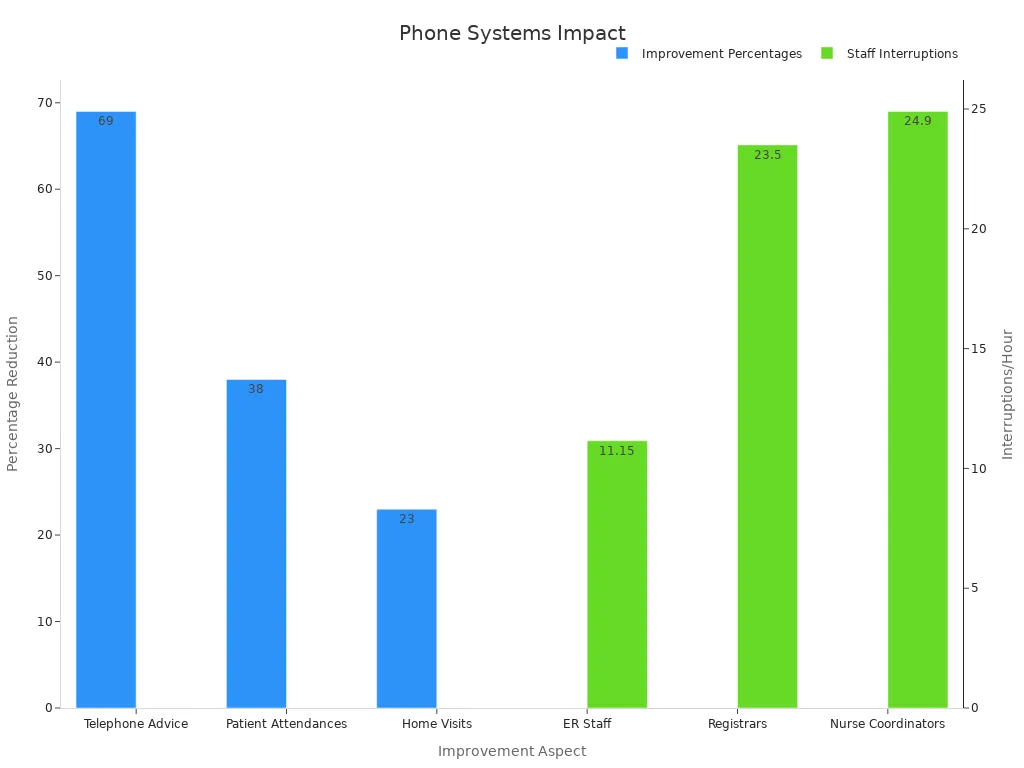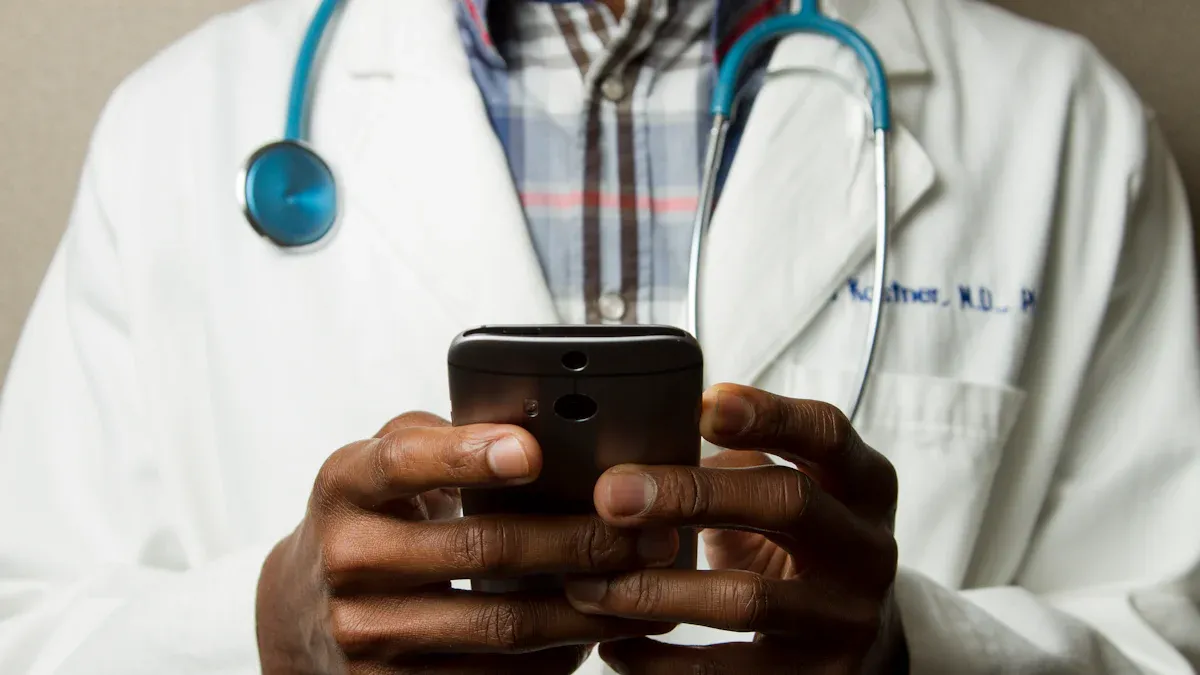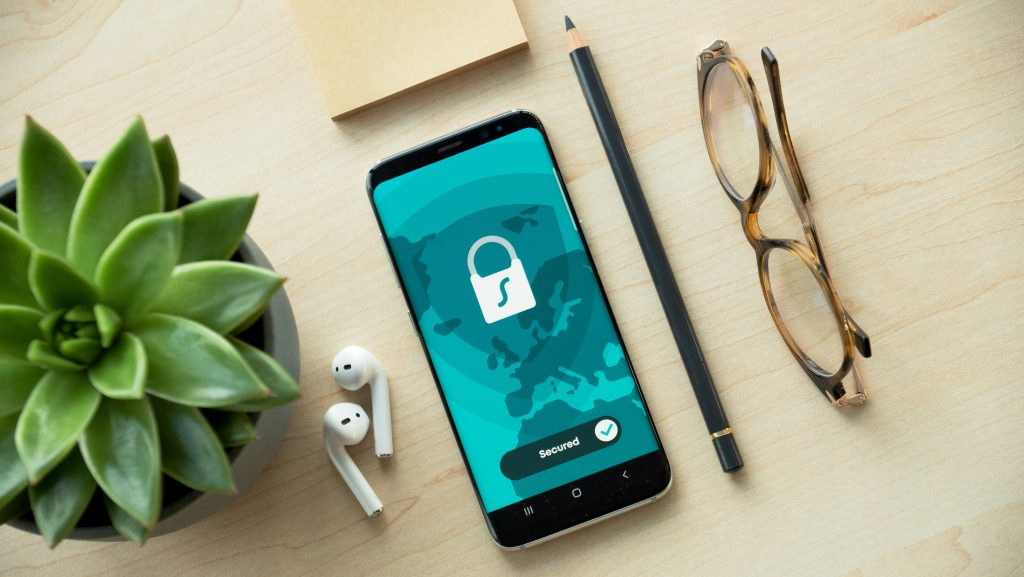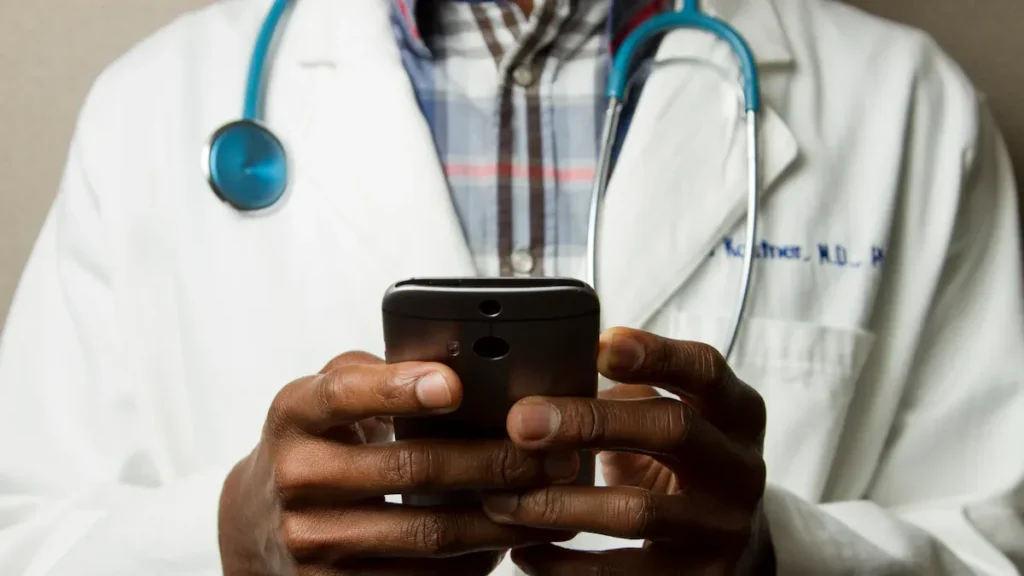
Hospitals rely on a phone system to support daily operations. Modern phone systems help reduce interruptions for staff, with emergency room teams facing up to 11.15 interruptions each hour. Advanced healthcare phone systems improve patient care by decreasing unnecessary home visits by 23% and reducing patient travel for specialist consults from 20% to 6%. Secure hospital phone systems also streamline communication, making it easier for teams to respond quickly and keep patients informed.
|
Aspect of Improvement |
Numerical Evidence |
Explanation |
|---|---|---|
|
Reduction in telephone advice |
69% decrease |
Nurse-operated telephone triage reduced calls to general practices significantly. |
|
Reduction in patient attendances |
38% decrease |
Fewer patients physically attended practices due to effective telephone triage. |
|
Reduction in home visits |
Home visits by nurses were reduced through telephone triage services. |
|
|
Interruptions per hour (ER staff) |
11.15 interruptions/hour |
High interruption rates in hospitals cause cognitive load; modern systems aim to reduce this. |
|
Patient travel for specialist consults |
Reduced from 20% to 6% after teleconsultation |
Teleconsultation options significantly decreased patients' need to travel overseas. |

Key Takeaways
-
Modern phone systems help hospital staff communicate quickly and clearly, reducing interruptions and improving teamwork.
-
Phone systems make it easier for patients to reach the right department and get timely updates, which boosts satisfaction and care quality.
-
Automated scheduling and reminders cut patient wait times and lower no-show rates, helping hospitals run smoothly.
-
Secure phone systems protect patient information while supporting fast emergency responses and better collaboration.
-
Hospitals using advanced phone systems see fewer errors, saved staff time, and better patient outcomes every day.
Internal Communication
Staff Coordination
Hospitals depend on strong staff coordination to deliver quality care. Modern phone systems, such as VoIP solutions, allow doctors, nurses, and support staff to connect instantly. These systems reduce communication issues by providing clear, direct lines between team members. When staff use healthcare phone systems, they can share updates quickly and avoid delays. This helps everyone stay informed about patient needs and hospital activities. Reliable phone systems also support flexible staffing, making it easier to bring in extra help during busy times. Advanced options, like the Vertu Signature S, offer secure and private communication for hospital leaders or VIPs, ensuring sensitive information stays protected.
Emergency Response
During emergencies, every second counts. Phone systems play a key role in rapid response. VoIP solutions and cloud-based phone systems let teams reach each other fast, even across different departments or locations. Hospitals use these systems to coordinate emergency workforce planning and manage patient transfers. Quick, accurate communication reduces wait times and improves patient outcomes. Secure phone systems also help protect patient data, meeting HIPAA requirements and keeping information safe during critical situations.
Department Collaboration
Collaboration between hospital departments improves patient care. Cloud-based phone systems make it easy for staff to communicate, whether they work in the same building or at different sites. These systems support instant messaging, video calls, and integration with electronic health records. Staff can access up-to-date information and share it with others, reducing errors and improving workflow. Healthcare phone systems with smart call routing and voicemail-to-text features help teams stay organized and respond to patient needs efficiently. Better collaboration leads to higher staff productivity and greater patient satisfaction.
Patient Experience

Department Access
A hospital’s phone system gives patients direct access to the right department. Patients can reach the pharmacy, billing, or specialty clinics without waiting for multiple transfers. Hospitals that use a uniform phone tree make it easy for callers to choose their department. This reduces confusion and helps patients get answers faster.
-
Studies show that hospitals with focused phone management see fewer missed calls and higher patient satisfaction.
-
Valley View Hospital lowered its missed call rate to 10% or less by analyzing peak times and adding staff when needed.
-
Hospitals also offer multilingual options, such as Spanish, so more patients can communicate easily.
-
Staff who answer calls with courtesy and speed help patients feel valued and supported.
These improvements in department access lead to better patient care and a smoother experience for everyone.
Appointment Scheduling
Efficient appointment scheduling is key to good patient care. Modern phone systems support automated scheduling, online booking, and quick check-ins. Hospitals that use block appointment scheduling have seen up to a 56% reduction in patient wait times in the USA. In Sri Lanka, well-structured scheduling cut wait times by over 60%.
|
Country |
Scheduling System |
Reduction in Patient Wait Time |
|---|---|---|
|
USA |
Block appointment scheduling |
Up to 56% reduction |
|
سريلانكا |
Well-structured appointment |
Over 60% reduction |
|
موزمبيق |
Block appointment scheduling |
Reduced waiting time by 100 minutes |
|
UK |
Block appointment scheduling |
Significant reduction |
|
تايلاند |
Appointment systems |
Dramatic reduction in average waiting time |
Hospitals use AI-driven scheduling and appointment reminders to balance patient flow and reduce no-shows. Automated appointment reminders help patients remember their visits, which keeps schedules running smoothly and supports better patient care.
Timely Updates
Timely updates from phone systems keep patients informed about their care. Hospitals use phone calls and appointment reminders to share test results, changes in schedules, or health tips.
Regular updates help patients feel listened to and cared for by their healthcare team.
Research shows that patients who receive timely phone updates report higher satisfaction and better health awareness. In one study, older adults with chronic illness felt more supported and made healthier choices after regular phone check-ins. Verbal communication through advanced phone systems improves patient-centered outcomes, including satisfaction and mental health. These updates play a big role in building trust and improving patient care.
Healthcare Phone Systems
Operational Efficiency
Healthcare phone systems help hospitals work better every day. Staff can use these systems to connect with each other quickly. Features like online scheduling and SMS messaging let teams share updates without delay. Doctors and nurses can check patient information or send messages from any location. This saves time and helps everyone focus on patient care. Secure communication tools, such as encrypted calls, protect private information. Leaders in hospitals often choose advanced options like the Vertu Signature S. This luxury phone system offers end-to-end encryption and a private AI assistant, making it perfect for hospital executives or VIP patients who need both security and style.
Automation
Automation in healthcare phone systems changes how hospitals manage daily tasks. Automated scheduling lets patients book appointments without waiting on hold. Appointment reminders go out by phone or text, so patients remember their visits. These systems also send follow-up messages after a patient leaves the hospital. Automated call management can handle routine questions, which means staff spend less time on the phone and more time with patients. Hospitals that use automation see big improvements in workflow and staff satisfaction.
Error Reduction
Healthcare phone systems with automation help reduce mistakes. Hospitals that use automated systems with clinical decision support have seen medication errors drop by up to 54%. Adverse drug reactions have gone down by about 55%. Automated post-discharge calls have lowered hospital readmissions by as much as 56%. No-show rates for appointments have dropped by up to 39% when hospitals use automated reminders. Patient engagement has increased by 60% with follow-up call systems. Staff save up to three hours each day, and labor demands can drop by 92%. The table below shows some of these results:
|
Metric / Outcome |
Result / Impact |
Example / Source |
|---|---|---|
|
Medication errors reduction |
Up to 54% decrease |
Automated systems with clinical decision support |
|
Adverse drug reactions reduction |
About 55% decrease |
Same as above |
|
Hospital readmissions reduction |
41% to 56% decrease |
Automated post-discharge communication studies |
|
No-show rates reduction |
Up to 39% decrease |
Automated reminders in hospital settings |
|
Patient engagement increase |
Up to 60% increase |
Automated follow-up call systems |
|
Labor demands reduction |
Up to 92% decrease |
Automated call management systems |
|
Staff time saved |
Up to 3 hours daily |
Automated call management |
Hospitals that use advanced healthcare phone systems see fewer mistakes, happier patients, and smoother operations.
Hospitals see real improvements when they upgrade to modern, secure, and luxury phone solutions. These systems help staff communicate clearly, support patients with fast updates, and make daily tasks easier.
-
Studies show that mobile phone use increases accuracy in clinical work and helps staff deliver care in remote areas.
-
Healthcare teams use smartphones to view images and follow protocols, which improves service and confidence.
Modern phone systems help hospitals deliver better care every day.
التعليمات
What features do hospital phone systems offer?
Hospital phone systems provide call routing, voicemail-to-text, secure messaging, and automated appointment reminders. Many systems support video calls and integrate with electronic health records. These features help staff communicate quickly and keep patient information safe.
How do hospital phone systems improve patient care?
Hospital phone systems connect patients to the right department fast. They allow staff to share updates and reminders. Patients receive timely information about appointments and test results. This helps reduce confusion and improves overall care.
Are hospital phone systems secure?
Yes. Most hospital phone systems use encryption to protect calls and messages. They follow strict privacy rules, such as HIPAA. Secure systems keep patient data safe from unauthorized access.
Can hospital phone systems reduce staff workload?
Automated features in hospital phone systems handle routine calls, schedule appointments, and send reminders. Staff spend less time on the phone and more time helping patients. This leads to better workflow and higher job satisfaction.
Do hospital phone systems support multiple languages?
Many hospital phone systems offer multilingual options. Patients can choose their preferred language when calling. This helps hospitals serve diverse communities and ensures clear communication for everyone.




